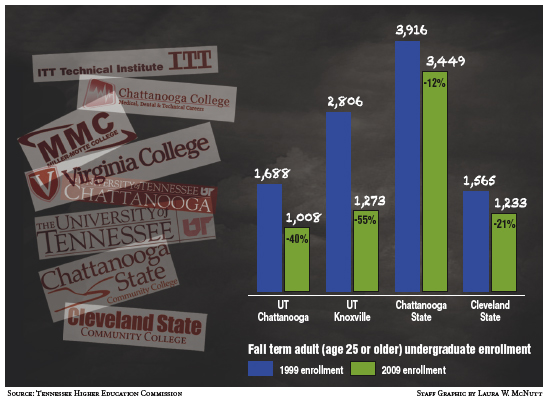Even with record-high enrollment, public universities and community colleges are hemorrhaging a coveted demographic in higher education: adult students.
Students over the age of 25 -- many with full-time jobs and families -- are being targeted by for-profit career colleges aggressively market their associate degree and diploma programs as speedier and more relevant choices for busy students.
"Our students receive more attention," said Anne Landis Williams, executive director of the Tennessee Association of Independent Colleges and Schools, an organization of for-profit schools and colleges. "There are no irrelevant electives that are required. They aren't required to take anything that doesn't directly apply to their job."
The association represents Miller-Motte Technical College and Virginia College, which have locations in Chattanooga. The city also has other for-profit colleges, including Chattanooga College and a University of Phoenix campus.
Officials with Miller-Motte Technical College, Virginia College and Chattanooga College did not return calls for this report.
Tennessee Higher Education Commission officials say they would be more concerned with the share of students fleeing their schools to for-profit counterparts if the state's technology centers, community colleges and universities weren't already being stretched to meet growing demand with fewer resources.
"We just don't have the capacity," said Rich Rhoda, executive director for the THEC. "These students are being served by for-profit institutions. If they are getting the training they are seeking and are being employed, then there is absolutely nothing wrong with that."
In the last decade, adult enrollment has plummeted at many public colleges statewide, but particularly in Chattanooga, according to data compiled by THEC.
UTC adult enrollment has shrunk 40.3 percent since 1999 to total 1,008 students in the fall term of 2009. The share of adult students at Chattanooga State Community College decreased 11.9 percent, and at Cleveland State Community College the number is down 21.2 percent.
"Part of it has been our move to a more traditional campus that is going to appeal to more traditionally aged students," said Chuck Cantrell, a spokesman for the University of Tennessee at Chattanooga.
"There are also a lot of options now for adult students, even though some of those options are far more expensive, they are willing to pay it for the benefits of flexible scheduling, online classes and night classes," he said.
At the same time, the for-profit sector of higher education, marketed mainly to older students, is gaining a lot of momentum, said officials with THEC, which monitors the 350-plus career colleges in Tennessee.
The commission doesn't track enrollment growth at individual colleges, but shows enrollment at for-profit schools jumped from 70,000 in 2008 to 80,000 in 2009 statewide. Sixty-nine percent of those students are over the age of 25, records show.
For-profit schools are often highly scrutinized by public education officials and lawmakers for making big promises through flashy marketing and charging hefty tuition, in some cases paid for by high-interest private student loans.
In 2008, legislators pushed to bring the for-profit schools under THEC's oversight, and now those schools must report on dropout, job placement and loan default rates, financial stability and academic faculty hiring.
Still, some say a few of their practices could be a model for public colleges, which have struggled to improve inefficiencies as they balance enrollment booms with severe budget cuts.
Students get flexible scheduling that can work around their jobs and can enter programs year round. The schools also offer specific training programs without general education requirements.
Kenya Jenkins, a 27-year-old studying medical billing and coding at Virginia College in Chattanooga, said she chose a for-profit school because she wasn't intimidated by the atmosphere. Her cousin had attended the school and got a good job after graduation.
"This is the school that did more advertising," she said. "It's smaller here, and they are more one-on-one and personal with you."
She said she had taken a few classes at Chattanooga State for a dental assistant program but was discouraged about the job prospects.
The price tag for her education now is much higher, $3,904 for 12 hours per quarter at Virginia College compared with Chattanooga State's $1,477 for a full load of classes per semester. But, like many students at accredited for-profit schools, she uses Pell grants to pay for her technical certificate.
Many of the for-profit schools, including Virginia College, are located in the Eastgate Town Center off Brainerd Road, next to the local unemployment office.
Outside of television and billboard ads for accessible, life-changing training, their locations draw a lot of adult students looking to reinvent themselves after job losses or pay cuts.
In hopes of competing for those students, Chattanooga State opened its East Campus at the Eastgate Town Center and offers career and technical programs at the location, said Jeff Olingy, a spokesman for Chattanooga State.
He said Chattanooga State keeps its eye on for-profit schools and their enrollment numbers, but isn't concerned about the competition.
"We are very much aware of what they are doing, but don't feel threatened by what they are doing," he said.
Continue reading by following these links to related stories:
